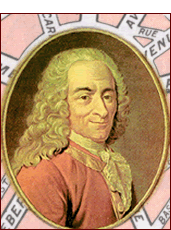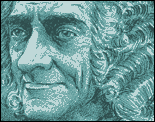It Is
True.
It Is Not.
Voltaire:
An Enlightened
Wise Guy?
Dr. Ronald Fritze
April 12, 2004
It is true that some professors,
and above all some schoolboys,
know it all perfectly.
Voltaire,
"Matter" in Philosophical Dictionary (1764)
Those familiar with Voltaire's style will know that when he said, "it is true", he did not mean it. And formal higher education takes a ribbing from a master satirist. Although I must say, Voltaire did not know my students as I am sure they will all know their material perfectly for the upcoming final exam.
Voltaire was a master of satire and social criticism. Educated people will recognize his name and associate it with the Enlightenment. His humorous, satirical novel Candide can still be read with enjoyment and unlike many books of the Enlightenment it is accessible and short. In other words, ideal for use in class and in anthologies. As a result many modern students have read it. Generally, Voltaire is presented to moderns as our kind of guy. But was he?
Voltaire was born Francois-Marie Arouet in 1694 and the first twenty years of his long life were lived under the rule of Louis XIV. It was an experience that influenced him profoundly and he would maintain a life-long admiration of the Sun-King. His father was a notary and he wanted his son to become a lawyer. Young Francois-Marie wanted to be a writer and he managed to prevail over his father's wishes. Entering the smart society of Paris, he wrote odes and satires. He was accused of writing a satire about the Regent, Philip of Orleans, and that earned him a six-month involuntary stay in the Bastille.
On another occasion Voltaire's wit insulted the honor of a certain noble. But the irate noble did not challenge Voltaire to a duel to settle the matter. Voltaire was a commoner and nobles did not duel with commoners. Instead, he arranged for some thugs to beat up the hapless Voltaire. Adding insult to injury, Voltaire was charged with assault on the thugs and sent to jail. It was an experience that embittered him against nobles and their privileges.
During his visit to England in 1726 to 1729, he developed a deep admiration for English intellectualism and their toleration. His opinions were reflected in his Philosophical Letters on the English (1733).
Voltaire advocated liberty, reform, and toleration but he did not seek to achieve those things by means of a democratic republic such as the United States.  The fact is that Voltaire was an elitist, but his was an elitism based on ability not birth. And he did not advocate democracy or republicanism. His ideal form of government was enlightened royalism, i.e., the rule of a wise and benevolent king. Perhaps he was thinking of Louis XIV? During the early 1750s, Voltaire visited Frederick the Great of Prussia in the peaceful interval between the War of the Austrian Succession and the Seven Years War. He hoped to find his enlightened king in Frederick the Great but came away disappointed. Catherine the Great of Russia also would later disappoint him. The fact is that Voltaire was an elitist, but his was an elitism based on ability not birth. And he did not advocate democracy or republicanism. His ideal form of government was enlightened royalism, i.e., the rule of a wise and benevolent king. Perhaps he was thinking of Louis XIV? During the early 1750s, Voltaire visited Frederick the Great of Prussia in the peaceful interval between the War of the Austrian Succession and the Seven Years War. He hoped to find his enlightened king in Frederick the Great but came away disappointed. Catherine the Great of Russia also would later disappoint him.
Voltaire was not a pre-mature socialist either. Like most Enlightenment thinkers, he was a supporter of private property and did not have any qualms about accumulating wealth. Voltaire was the first writer to actually become rich as a result of the sales of his books. That was quite an achievement in an age when copyright protection was ineffectual or non-existent. Furthermore, Voltaire engaged in smart investments of his money. His favored method was to purchase annuities but he also invested in land and businesses. His writing made him rich; his investing made him richer and gave him a secure and comfortable old age.
While Voltaire may have hated the nobility and its privileges, later in life he adopted the opulent life-style of the nobility. About 1760 he purchased the manor of Ferney near Geneva and on it he built a small but tasteful chateau. Voltaire employed a large number of servants and had many quests. He staged plays at his house while serving supper to as many as eighty quests. It was a sort of private dinner theater. Other visits were made to a rented estate at Tournay.
In March 1778 he was allowed to visit Paris in triumph. There he was crowned with a laurel wreath at the Comedie Francaise. Shortly after that he died at the age of eighty-four, missing the outbreak of the French Revolution by a mere ten years. His writings, however, helped to create the ferment that lead to the French Revolution. Whether he would have liked the Revolution is uncertain. Whether the Revolution would have continued to like Voltaire is also equally uncertain. Chances are the canny Voltaire would have stayed on the sidelines at his chateau of Ferney and followed the advice of his character Candide, "we must cultivate our garden."
Father Knows Best?
March 29, 2004.
The times do not adapt themselves to men but men must adapt themselves to the times.
Pen Trumps Sword.
March 17, 2004.
The affair of displacing the Duke of Marlborough will do all for us we desire.
Russia's Path to Empire.
March 14, 2004.
I have not spared and I do not spare my life for my fatherland and my people.... Two things are necessary in government namely order and defence.
William Walks the Walk.
February 26, 2004.
Between 1689 and 1714 England fought two great wars with the France of Louis XIV. These wars helped to transform England into a world power through its eventual victory over France.
The Sun King Burned.
February 12, 2004.
"Every time I make an appointment, I make one ungrateful person
and a hundred with a grievance."
The Moderns Won.
February 2, 2004.
By its nature, the human mind is indeterminate; hence, when man is sunk in ignorance, he makes himself the measure of the universe.
What Price Power?
January 21, 2004.
An nescis, mi fili, quantilla prudentia regitur orbis?
[Do you not know, my son, with how little wisdom the world is governed?]
The Old Regime.
January 9, 2004.
"The past is a foreign country, they do things differently there."
|

